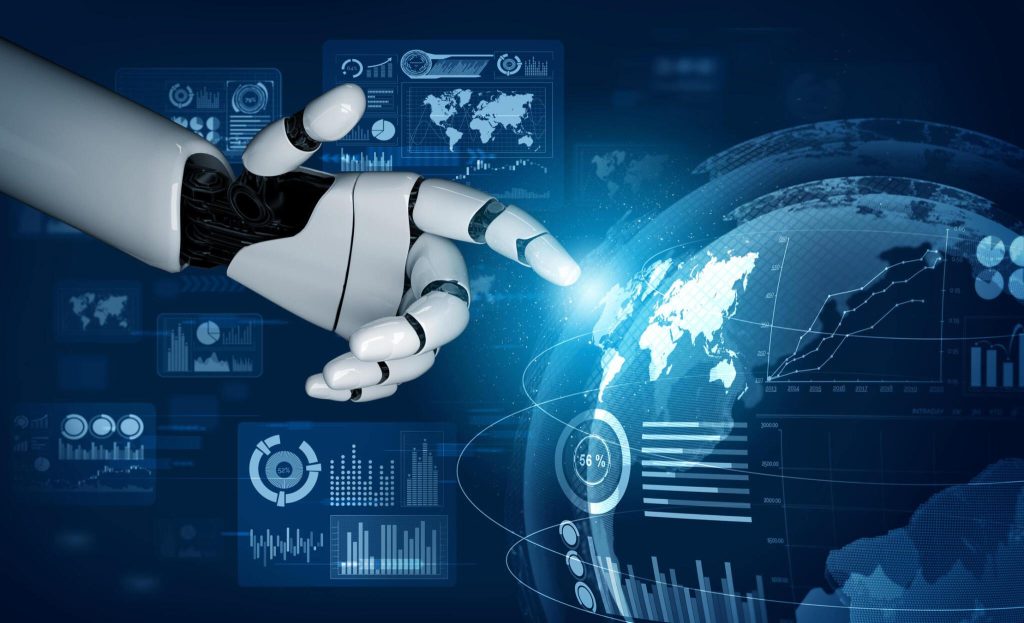India’s IT sector, once a quiet giant exporting technical prowess, is poised for a revolution. The rising stars of Artificial Intelligence (AI), Machine Learning (ML), and Data Analytics are set to rewrite the script, transforming industries, empowering individuals, and reshaping the nation’s future. But this future isn’t just a passive unfolding – it’s a collaborative odyssey where individuals, businesses, and policymakers must play their part. So, fasten your seatbelts, grab your data goggles, and let’s explore this exciting journey!
The Landscape: Ripe for Disruption:
Several factors make India the perfect petri dish for AI, ML, and data analytics to thrive:
- Demographic Dividend: A young, tech-savvy population provides a vast talent pool to fuel innovation and development.
- Data Deluge: India generates mountains of data, the lifeblood of these technologies. Government initiatives like Digital India and Aadhaar further enrich this data ecosystem.
- Startup Spark: A burgeoning startup scene fosters agility and creativity, ideal for incubating AI-powered solutions.
- Government Backing: Recognizing the potential, the Indian government has launched initiatives like the National AI Strategy and Mission Innovation, propelling India’s AI leadership.
Transforming Visions: From Healthcare to Smart Cities:
Across diverse sectors, AI, ML, and data analytics promise to revolutionize the way we live, work, and interact with the world:
- Healthcare: AI-powered diagnostics can detect diseases early, personalize treatment plans, and even perform robotic surgery. ML algorithms can predict outbreaks and optimize resource allocation, making healthcare more accessible and efficient.
- Education: AI-powered tutors can adapt to individual learning styles, personalize learning paths, and democratize access to quality education. Data analytics can track student progress and identify learning gaps, ensuring no child gets left behind.
- Agriculture: Precision agriculture powered by AI and ML can optimize crop yields, minimize water waste, and reduce pesticide use. Weather prediction algorithms can empower farmers to make informed decisions and mitigate risks.
- Smart Cities: Imagine traffic lights that adjust to real-time traffic flow, waste management systems that predict and prevent overflowing bins, and intelligent buildings that optimize energy consumption. AI and data analytics can transform urban landscapes into efficient and sustainable living spaces.
- Fintech: Fraud detection algorithms will become more sophisticated, while personalized financial advice and automated investment management will become the norm. AI-powered chatbots will revolutionize customer service, making financial services more accessible and convenient.
Challenges and Opportunities: Navigating the Road Ahead:
While the future is bright, challenges lie ahead:
- Skill Gap: Bridging the gap between the current workforce and the skills required for the AI-driven future is crucial. Upskilling and reskilling programs need to be prioritized, and educational institutions must adapt their curriculum to equip students with the necessary skills.
- Ethical Considerations: Bias in algorithms and data privacy concerns need to be addressed through robust ethical frameworks and regulations. Ensuring transparency and accountability in AI development is crucial for building public trust.
- Infrastructure Bottlenecks: Robust digital infrastructure and high-speed internet connectivity are essential for seamless adoption of these technologies across the country. Bridging the digital divide and ensuring equitable access to the internet is crucial for inclusive growth.
Actionable Steps: A Collaborative Journey:
To unlock the full potential of AI, ML, and data analytics, collaboration is key:
Individuals:
- Embrace lifelong learning: Upskill and reskill yourself to stay relevant in the changing landscape. Explore online courses, bootcamps, and workshops on AI, ML, and data analytics.
- Champion ethical AI: Advocate for responsible development and use of AI, promote awareness of potential biases, and support initiatives that address ethical considerations.
- Contribute to open-source projects: Share your knowledge and skills by contributing to open-source AI and data science projects, accelerating the development of these technologies.

Businesses:
- Invest in AI and data analytics: Integrate these technologies into your operations to improve efficiency, gain insights, and drive innovation.
- Foster a culture of data-driven decision-making: Leverage data to inform your business strategies, optimize your operations, and personalize customer experiences.
- Support AI talent development: Partner with universities and training institutions to develop skilled AI professionals and bridge the skill gap.
Policymakers:
- Develop a robust AI strategy: Create a clear roadmap for AI development and adoption, focusing on ethical considerations, infrastructure development, and talent development.
- Invest in research and development: Fund research in key areas of AI, ML, and data analytics to drive innovation and ensure India remains at the forefront of this field.
- Promote collaboration: Facilitate partnerships between academia, industry, and government to accelerate the development and adoption of AI solutions.
Building a Future for All: Beyond Just Technology
In our exploration of India’s AI-powered future, we must remember that technology is not an end in itself, but a tool to empower people and create a more equitable and sustainable society. Here are some additional points to consider:
- Bridging the Digital Divide: Ensuring equitable access to AI benefits requires addressing the digital divide. Initiatives like affordable internet access, tech literacy programs, and targeted training for marginalized communities are crucial.
- Focus on Human-Centered AI: AI should be designed to augment human capabilities, not replace them. We need to prioritize ethics, transparency, and fairness in AI development to ensure it benefits everyone.
- Promoting Responsible Innovation: As AI shapes various sectors, it’s important to consider potential disruptions and ethical dilemmas. Responsible AI development, including robust regulatory frameworks and public discourse, is vital to mitigate negative impacts.
- Empowering Small and Medium Businesses: AI can be a powerful tool for small and medium businesses (SMBs) to compete with larger players. We need to make AI technologies more accessible and affordable for SMBs through targeted initiatives and support programs.
- Fostering Creativity and Innovation: While AI excels at certain tasks, human creativity and ingenuity remain essential. Encouraging creative thinking and problem-solving alongside AI skills will be crucial for continued innovation and development.
- Building a Data-Driven Economy: To reap the full benefits of the data-driven economy, India needs to invest in data infrastructure, data governance, and data security. Robust data protection frameworks and individual data ownership rights are vital to build trust and encourage data sharing.
- Learning from Global Leaders: While India has unique strengths and challenges, it can also learn from other nations leading the way in AI. Collaboration with global partners can accelerate India’s AI journey and avoid potential pitfalls.
Conclusion:
India’s future with AI, ML, and data analytics is brimming with possibilities. By addressing the challenges, embracing collaboration, and prioritizing ethical considerations, India can shape a future where technology empowers individuals, fuels development, and creates a more inclusive and equitable society. The responsibility lies not just with tech giants and policymakers, but with each of us. By contributing our skills, advocating for responsible development, and embracing lifelong learning, we can together build a future where AI not only transforms India, but benefits all of humanity.






Leave a Reply